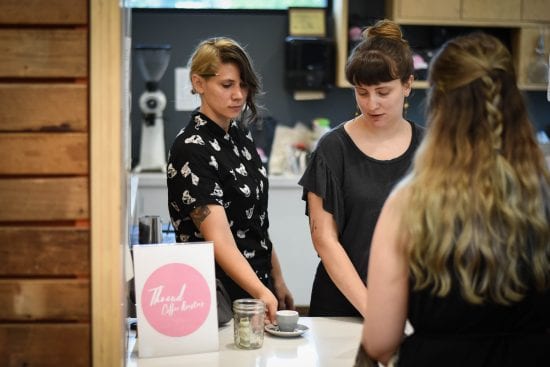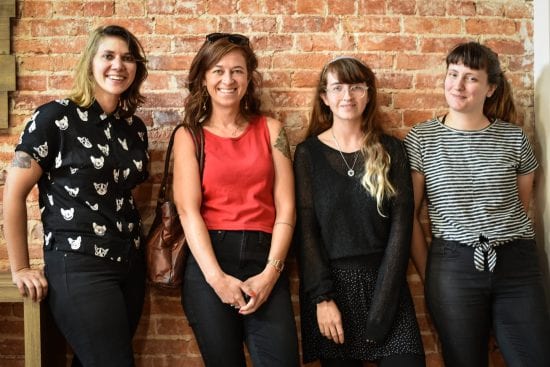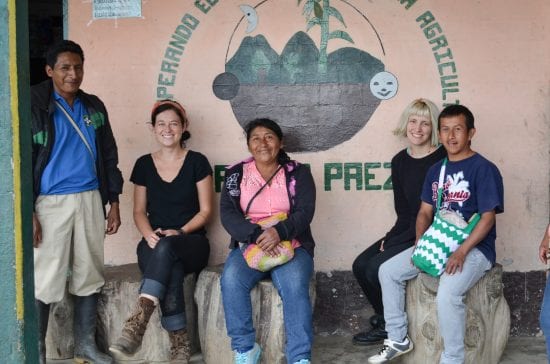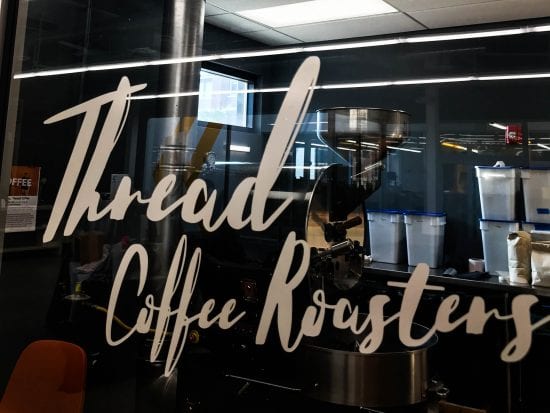
Thread Coffee in Baltimore shares how their co-op model creates room for marginalized voices throughout the coffee supply chain.
BY RJ JOSEPH
SPECIAL TO BARISTA MAGAZINE
Photos courtesy of Thread Coffee
In this series, we highlight cooperatively run coffee shops and explore the details of what makes co-ops tick. To learn more about the co-op model, read our feature in the the October + November issue of Barista Magazine.
Since 2012, Baltimore’s Thread Coffee has been roasting coffee and promoting equity within their supply chains. A women- and queer-owned worker co-op, they’ve grown from a makeshift roaster behind worker-owner Casey McKeel’s house to a powerful pathway to business ownership in their community.
Mission
According to Casey, Thread’s official mission is “commitment to a transparent model of trade that promotes dignity, sustainability, and solidarity while uplifting the role of people from marginalized identities in the coffee industry.” In practice, what that means is that all workers own an equal share of the company and participate in the decision-making process. Another facet is the empowerment of those from marginalized backgrounds; not only is the company owned by women and nonbinary folks, they also prioritize purchasing coffee from farmers who are part of social movements they believe in, like indigenous communities striving for autonomy from oppressive governments. Long-term relationship-based purchasing is also crucial to their model.

Structure
“We are structured non-hierarchically, meaning no bosses,” Casey told me. “We all share in the day-to-day responsibilities of running the business. We also recognize that each worker has different strengths and passions and divide up roles with that in mind. We have one person who is the lead roaster and graphic designer, one person who works on farmer relationships and the finances, and another who specializes in training and roasting, and we’re currently hiring for someone to do sales and manage a café.” All workers who join the co-op have the opportunity to work toward ownership, but not all do, and the current set of worker-owners represents not only founders, but folks who have worked their way into ownership.
When new tasks or projects come on the table, the group talks over who wants to work on them, allowing people to choose to develop new skills. “Because our team is so small right now, this sort of loose and flexible structure works well for us,” says worker-owner Michelle Fleming. “As we grow we may have to delegate responsibilities more concretely so things don’t fall through the cracks.”

Decisions
Thread operates on a consensus-based structure, but leaves small decisions for individuals. “We recognize that sometimes decisions just have to get made in order to run the business,” says Casey. “We leave big decisions for meetings and empower people to make smaller decisions specific to their job. For example, we all participate in deciding which farms to source from or whether to give ourselves raises, but wouldn’t need a meeting to decide how to reorganize our storage area or whether to schedule a meeting with a customer.”
Consensus-based decision-making definitely brings some challenges. “Not having a hierarchy among the worker-owners can be difficult when we aren’t in agreement,” says Michelle. “Working towards consensus can be bumpy when people feel strongly and are all equally invested. Long meetings get exhausting.”

Finances
Currently, everyone at Thread makes an hourly wage. Employees make a slightly lower wage than worker-owners, since they have less responsibility and aren’t on-call to deal with issues, but, as mentioned, anyone hired has the opportunity to pursue worker-ownership. Additionally, Thread’s rule is that no one can make more than twice what the lowest-paid worker makes, so when they raise wages, they do so from the bottom up.
“We also have capital share accounts set up using a $1000 buy-in from all our worker-owners,” says Michelle. “These accounts increase or decrease in value based on sales, we can pay out dividends from them in a good year if we choose to, and that money leaves with people if they move on from Thread. Workers are able to pay into their capital accounts up front when they become owners or contribute a set amount of their wages each week (usually $0.50 per hour worked) until the full $1,000 is paid.”
Challenges
One of the biggest challenges at Thread is reconciling their model with surrounding structures they have to interact with. “Even knowing we are a co-op, our landlords, importers, and customers seem to struggle with why it takes so long for us to get back to them with definite answers about certain things or why one person can’t give an answer,” says Michelle. While not every decision needs a meeting, due process at Thread means that no one can make important decisions unilaterally.

In addition, it can be hard for worker-owners coming from other companies to adjust to the non-hierarchical structure. “Having worked in the service industry for a while, I’ve become used to being told what to do and having no say in how things are run,” says worker-owner Holly Kent-Payne, who came to Thread after Bow Truss Coffee folded. “It can sometimes be difficult for me to get out of that passive mentality and really take responsibility for making things happen, without waiting for someone to tell me what to do.”
Benefits
One of the biggest benefits of the co-op structure Michelle cites is the companionship that comes with being part of a collective. “I don’t know that I could be the sole owner of a business. It’s amazing to work in a team of people I trust, who hold me accountable to the principles that are at the core of Thread, that share in the burden of solving crises as they arise,” Michelle told me. “I think our shared vision is stronger than my singular vision could ever be. We’re coming from different backgrounds, different experiences, and we can do something more meaningful because of all the voices that have equal value in our work.”

In addition, Michelle takes inspiration from the opportunity Thread gives marginalized people to grow into ownership roles: “You can own a business while learning financial literacy, you don’t have to have a bunch of personal assets to get a loan because the business already exists, and you are buying in on a small scale rather than needing to raise a bunch of money as an individual. You have partners with the skills you don’t.”
“I have never been given a reason to feel ownership over my work at any other job I’ve had in the coffee industry,” says Holly. “Knowing that your labor and skills are creating all this value that you’ll only ever receive a tiny slice of doesn’t make you feel invested in the company, it makes you feel exploited. The relation between bosses and workers is fundamentally oppositional—we do not share the same interests. Being part of a co-op, I have a literal sense of ownership over the work I’m doing, and we work together, not against each other, because growing our business is in all our best interests; for the first time, work is empowering.”
 ABOUT THE AUTHOR
ABOUT THE AUTHOR
RJ Joseph roasts coffee and writes a blog called Queer Cup in addition to her other adventures in coffee journalism. Her writing focuses primarily on equity, workers’ rights, and alternatives to the status quo. In her free time she loves cooking, reading, and being in Oakland, Calif. You can follow her on Instagram and Twitter.

